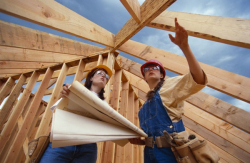Common Definition: A person who builds or constructs buildings.
 Unauthorized Definition: Someone who can’t stand working in an office all day and would rather drive between job sites, jabbering on the phone. Even if this means talking with crazy homeowners, clueless suppliers and no-show subcontractors. While builders were once exclusively truck driving, swearing, butt crack flashing men. Thankfully brave women are now entering the profession in greater numbers, especially in home-building.
Unauthorized Definition: Someone who can’t stand working in an office all day and would rather drive between job sites, jabbering on the phone. Even if this means talking with crazy homeowners, clueless suppliers and no-show subcontractors. While builders were once exclusively truck driving, swearing, butt crack flashing men. Thankfully brave women are now entering the profession in greater numbers, especially in home-building.
Sound Like a Pro: Several flavors of builder actually exist, each with a different world view. They’re largely defined by level of professionalism, craftsmanship and education. Matching homeowner goals with builder type is desirable.
• Classic Builder – The archetypal builder, Classic Builders are still around but quickly becoming mythical figures. Classic Builders emphasize craftsmanship and quality above speed. While they’re usually quite service oriented, they often sacrifice business for the art and craft of construction. However, seasoned builders have learned to be good at both, if their still in business. Builders usually have a core crew of foremen and tradespeople. But even they hire out specialized work like concrete and the licensed trades of electrical and plumbing.
• Home Builder – A Classical Builder who specializes in homes. In reality, that’s the only place for builders these days. The commercial world is largely too cut throat for Classic Builders.
• Design/Build – Another traditional model, harking back to the Medieval master craftsman who oversaw both the design and construction of cathedrals. In reality, no one person ever did this by themselves. Today’s design/build operations divide the work between teams, just like in the old days. Design/build teams emphasize design while being more practical than architects. They usually take pride in the craft also. These teams can be efficient and cost competitive.
• Contractor – A business school graduate who just happens to work in construction. In the commercial world, this is all you get. Home-building is increasingly populated by this breed of animal. Keep in mind, they’re essentially construction managers “contracting” everything out. And may not have any employees beyond office staff. Yet, many seasoned contractors are capable of delivering a quality project at a reasonable price.
• Pickup Truck Contractor – Usually a young upstart with a mobile office (only a pickup truck). Lack of an address doesn’t mean they’re less capable, but the risk is higher. If the project goes bad they can vanish, simply by driving their office to the next town. Check references thoroughly before hiring anyone, especially a Pickup Truck Contractor.
• Disaster Chaser – When answering the door after a hail storm and it’s a roofer. The odd are good this person just drove into town, with dreams of desperate homeowners and piles of easy money. There’s no good way of telling whether Disaster Chasers have any experience or skill at the marketed task. No matter how good the pitch, best stay clear of these folks. Hire a local Tradesperson with a proven record.
• Retail Salesperson – When your local lumberyard sells installation services. Or flyers feature replacement windows. Beware of the retail trap. Sometimes the deal is real. Most often a salesperson is marking up the services of an independent subcontractor. You’ll likely get a reasonable product, but may pay considerably more for the middleman. The upside, a reputable lumberyard is more likely to stand behind the work.
• Subcontractor or Tradesperson – The true backbone of the home-building industry. These are the people and companies that actually do the work from concrete and framing to plumbing, electrical, roofing, etc. Some companies look like subcontractors but are geared towards the “retail” homeowner market and charge accordingly. Good, reasonably priced subcontractors are continually booked by savvy builders and contractors. But they’ll work directly for homeowners on occasion. Be careful not to hire an unlicensed subcontractor for dangerous work like electrical, plumbing or heating.
• Handyman – For many small tasks and maintenance items, a handyman may be all you can get. Some are quite good at a variety of tasks. Just don’t expect them to handle large projects like additions. And make sure you’ve checked the quality, cost and timeliness of their work. Also, be careful having them complete potentially dangerous tasks like electrical or heating. Better to hire a licensed Tradesperson.
Fun Trivia: Many people assume ancient cultures built their own homes, so builders are a newer profession. Not true, builders have been around for millennia. The ancient Code of Hammurabi, a list of Babylonian laws from ancient Mesopotamia dating to around 1754 BC, specifically mentions home builders. The code contains 282 laws inscribed on twelve stone tablets. Law 229 states: “If a builder builds a house for someone, and does not construct it properly, and the house which he built falls in and kills it’s owner, then that builder shall be put to death”. Builders were very conscientious back then.
Builder image by Scott Lewis (Flickr)
Code of Hammurabi by Smith Currie & Hancock LLP, Construction Law Firm